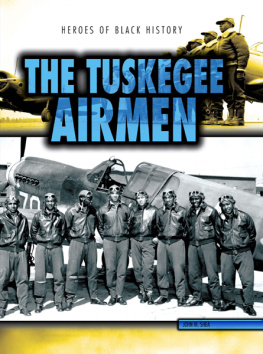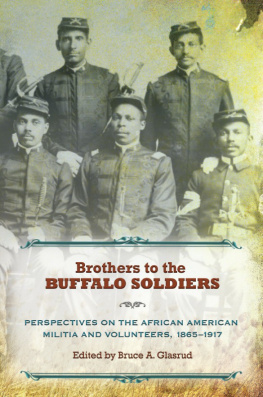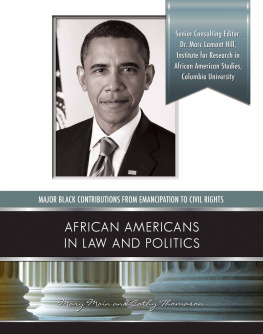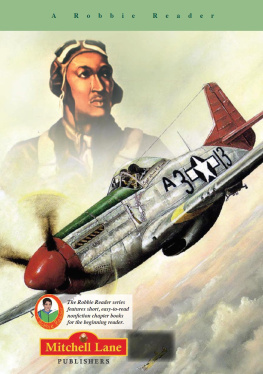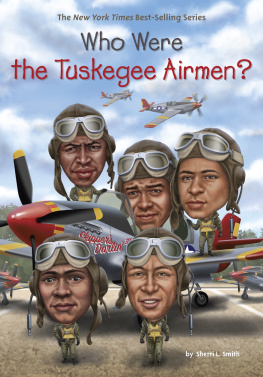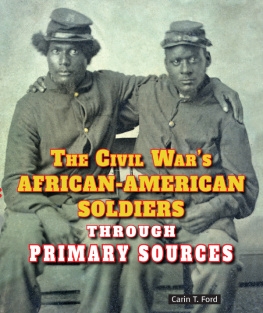
Published in 2020 by
Lucent Press, an Imprint of Greenhaven Publishing, LLC
353 3rd Avenue
Suite 255
New York, NY 10010
Copyright 2020 Greenhaven Press, a part of Gale, Cengage Learning
Gale and Greenhaven Press are registered trademarks used herein under license.
All new materials copyright 2020 Lucent Press, an Imprint of Greenhaven Publishing, LLC.
All rights reserved. No part of this book may be reproduced in any form without permission in writing from the publisher, except by a reviewer.
Designer: Deanna Paternostro
Editor: Diane Bailey
Library of Congress Cataloging-in-Publication Data
Names: Orr, Tamra, author.
Title: African Americans in the armed forces / Tamra B. Orr.
Description: New York: Lucent Press, [2020] | Series: Lucent library of black history | Includes bibliographical references and index.
Identifiers: LCCN 2019018270 (print) | LCCN 2019021180 (ebook) | ISBN 9781534568518 (eBook) | ISBN 9781534568501 (library bound book) | ISBN 9781534568495 (pbk. book)
Subjects: LCSH: United States-Armed Forces-African Americans. | African American soldiers-History.
Classification: LCC E185.63 (ebook) | LCC E185.63 .O763 2020 (print) | DDC 355.0089/96073dc23
LC record available at https://lccn.loc.gov/2019018270
Printed in the United States of America
Some of the images in this book illustrate individuals who are models. The depictions do not imply actual situations or events.
CPSIA compliance information: Batch #BW20KL: For further information contact Greenhaven Publishing LLC, New York, New York at 1-844-317-7404.
Please visit our website, www.greenhavenpublishing.com. For a free color catalog of all our high-quality books, call toll free 1-844-317-7404 or fax 1-844-317-7405.
CONTENTS
FOREWORD
F rom medicine and law to sports and literature, African Americans have played a major role in the history of the United States. However, these groundbreaking men and women often faced prejudice and persecution. More than 300 years ago, Africans were taken in chains from their home and enslaved to work for the earliest American settlers. They suffered for more than two centuries under the brutal oppression of their owners until the outbreak of the American Civil War in 1861. After the dust settled four years later and thousands of Americansboth black and white-had died in combat, slavery in the United States had been legally abolished. By the turn of the 20th century, with the help of the 13th, 14th, and 15th Amendments to the U.S. Constitution, African American men had finally won significant battles for the basic rights of citizenship, but the fight for equality was far from over. Even after the successes of the civil rights movement, the struggle continuedand it still continues today.
Although the history of the African American experience is not always a pleasant story, it is also filled with powerful moments of positive change. These triumphs of human equality were achieved with help from brave social activists such as Frederick Douglass, Martin Luther King Jr., and Maya Angelou. They all experienced racial prejudice in their lifetimes and fought by writing, speaking, and acting against it. By exposing the suffering of the black community, they brought people together to try to remedy centuries worth of wrongdoing.
Today, it is important to learn about the history of African Americans and their experiences in modern America in order to work toward healing the divide that still exists in the United States. This series aims to give readers a deeper appreciation for and understanding of a part of the American story that is often left untold.
Even before the legal emancipation of slaves, black culture was thriving despite many attempts to suppress it. From music to language to art, slaves began cultivating an identity that was completely unique. Soon after these slaves were granted citizenship, African American culture burst into the mainstream. New generations of authors, scholars, painters, and singers were born, and they spread an appreciation for black culture across America and the entire world. Studying the contributions of these talented individuals fosters a sense of optimism. Despite the cruel treatment and racist attitudes these men and women faced, they never gave up, and they helped change the world with their determination and unique voices.
The Lucent Library of Black History offers a glimpse into the lives and accomplishments of some of the most important and influential African Americans across historical time periods and areas of interest. From the arts and sports to the military and politics, the wide variety of topics allows readers to get a full and clear picture of the successes and struggles African Americans have experienced and are continuing to experience. Titles examine primary source documents and quotes from historical and modern figures to provide an enriching learning experience for readers. With detailed timelines, unique sidebars, and a carefully selected bibliography for further research, this series gives readers the tools to independently discover historical events and figures that do not often get their time in the spotlight.
By balancing the harsh realities of the past and present with a sense of hopefulness for the future, the Lucent Library of Black History helps young people understand an essential truth: Black history is a vital part of American history.
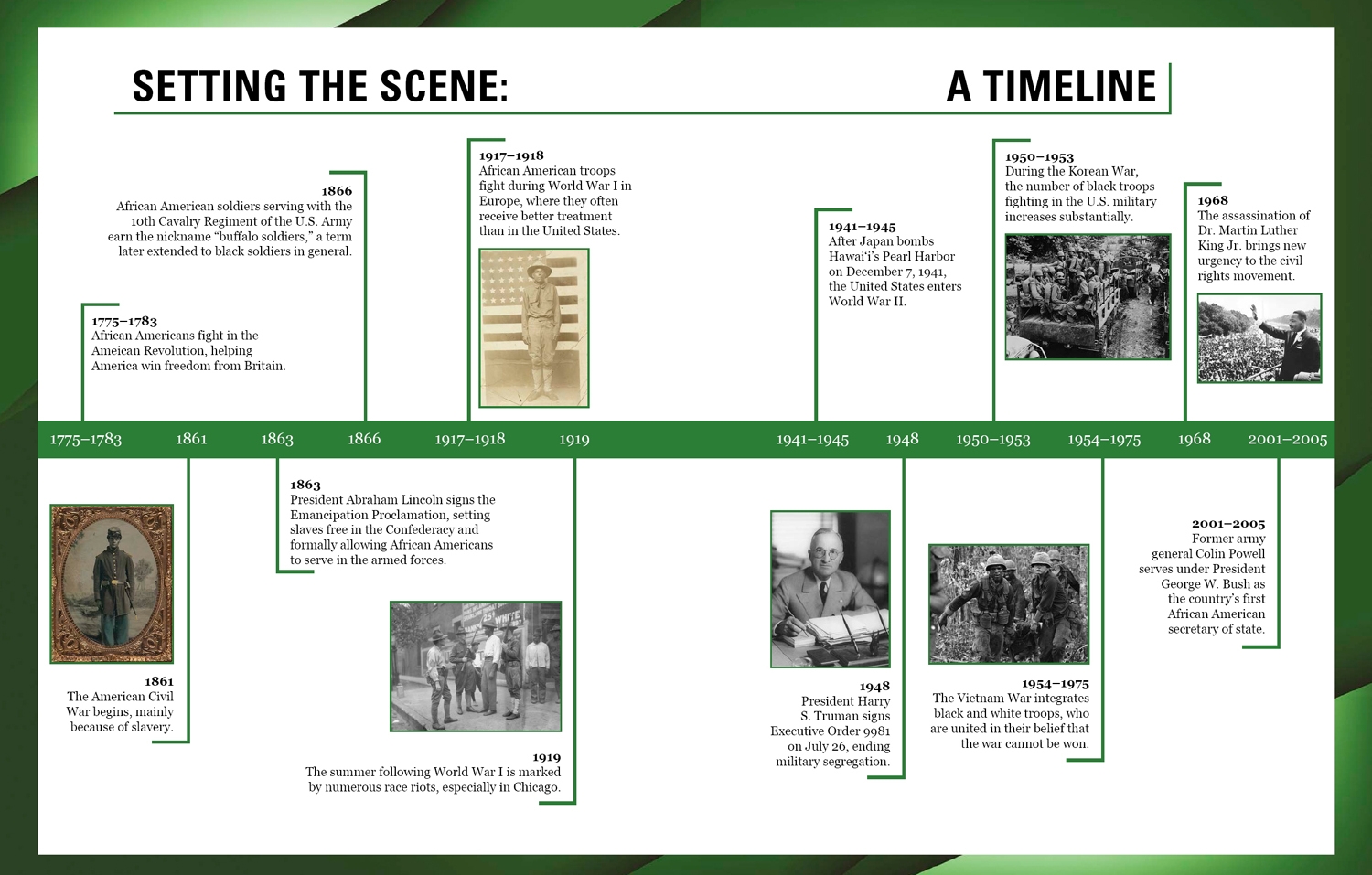
INTRODUCTION
SECOND-CLASS CITIZENS
E ver since the African slave trade began in the 15th century, black people have often been treated as inferior to white people. A steady supply of unpaid workers quickly became integral to the American economy, especially in the South. White people regarded blacks as little more than cattle, property to be used however they saw fit. Slaves were bought and sold with no consideration of their personal circumstances, and they were often mistreated or abused without reservation or remorse by their owners. They were perceived as lesser beings in every wayfrom intelligence to inherent value. Even after slavery became illegal in the 19th century, these ideas of inequality persisted.
Denials and Rejections
The enduring and pervasive belief in white superiority meant that most requests for equality from the black community were flatly denied. For centuries, this included not being allowed to serve in the armed forces. During the American Revolution, whites feared letting black slaves serve because they would be using weapons that they could easily turn against their white owners. Later, objections were based on long-held beliefs that blacks did not have the physical abilities, mental discipline, or moral character required to carry out the variety of difficult tasks demanded of soldiers.
The militarys refusal to permit blacks to join their ranks did not last for long. When it became clear that winning depended on having more soldiers, officers and administrators begrudgingly changed their stance, even if they still believed blacks were inferior. Because of this, black soldiers have participated in every American war.
Being allowed into the U.S. military did not translate to equal treatment, however. African Americans were typically issued the worst equipment and given lower quality uniforms than their white counterparts. As recently as World War II, black Americans were not allowed to be marines or air force pilots. They could join the navy but only as workers in the mess hall, or cafeteria. The army allowed some black soldiers to fight, but only in allblack regiments that were usually led by white officers.
Next page







